How To Keep Your Chickens Healthy (and get amazing eggs) – The Ultimate Guide
You love your pasture-raised chickens. They allow you an opportunity to enjoy creation, and make a little money, and watching them is non-stop entertainment!
But are you getting the best eggs possible?
Keeping a chicken healthy isn't as easy as 1-2-3! And, we all know that just because a chicken is pasture-raised doesn't necessarily mean it's healthy.
The pressure to have healthy chickens is not fun, especially when you aren't sure how to keep your flock healthy. You deserve the confidence of advertising your eggs and knowing they are good and healthy.
So, we're here to help. We've combined our experience here at The Mobile Chicken House with the vast knowledge of the head animal nutritionist, Jeff Mattocks, from The Fertrell Company, to teach you how to keep your chickens healthy and get quality eggs.
When you've finished the article, you'll be equipped with the knowledge to take care of your flock of chickens. All you have to do is read and execute these strategies, and you will avoid the insecurity of unhealthy chickens and instead be confident in your ability to raise a flock of chickens.
Let's get to it!
Benefits Of Healthy Chickens
Here are the basics of what you need to know: healthy chickens produce healthy eggs, and unhealthy chickens produce unhealthy eggs.
The same is true of any animal product we consume, whether meat, milk, or eggs. If the animal is genuinely healthy, it deposits more beneficial nutrients into what we're eating.
A study conducted by Mother Earth News found that compared to supermarket eggs, eggs from healthy chickens raised on pasture may contain:
- ⅓ less cholesterol
- ¼ less saturated fat
- ⅔ more vitamin A
- Two times more omega-3 fatty acids
- Three times more vitamin E
- Seven times more beta carotene
Wow! Having healthy birds and producing healthy eggs is worth it. It's beneficial to our health as well as the health of your chickens.
We'll get to the steps to ensure the health of your chickens soon, but before that, we have to understand how to know if your flock is healthy or not.
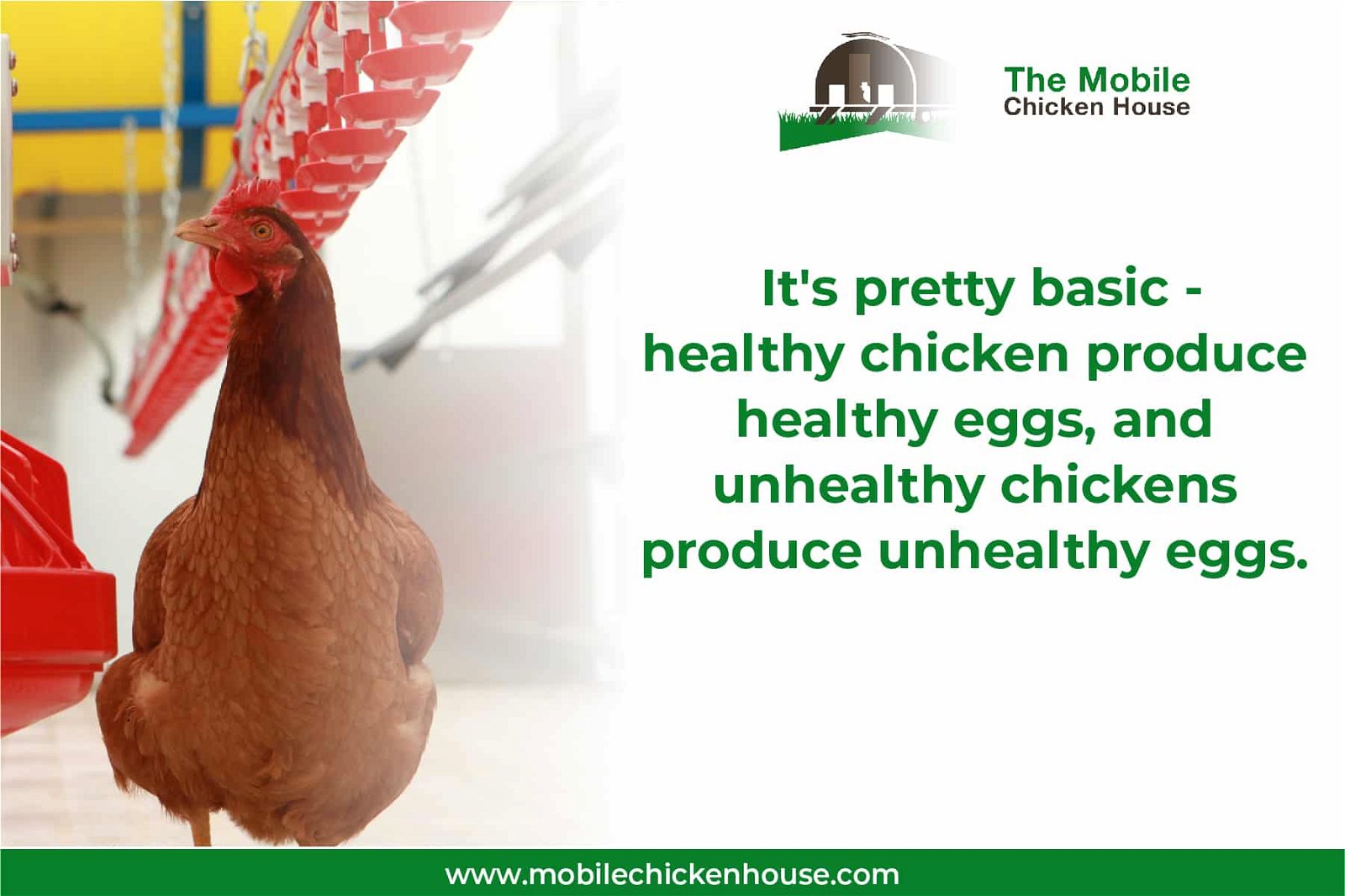
Assessing Your Flock's Health
It may not always be entirely apparent if your flock of chickens is healthy. Unhealthy hens continue to lay eggs, and if you aren't observing closely, you may start selling their sub-par eggs.
So, what do you need to look for when you are assessing the health of your flock?
- First, and most importantly, take your time. Don't expect to do a health check in 5 minutes. Chickens alter their behavior when you are around, so take a seat and be quiet. After about 15 minutes, the chickens will return to their normal routine, and you'll be able to observe them accurately.
- Listen! Chickens normally make a lot of cooing noises, and your ears can help with a health check-up if you listen carefully. Listen for gurgling noises or sneezes (yes, chickens sneeze). These are usually signs of respiratory infections and something you should resolve immediately.
- Look into their eyes. It sounds a bit creepy, but it's essential to do for chickens. Ammonia build-up will cause scarring in the chicken's eye, so check carefully for any signs of scars.
- Turn the chicken around backward and check for mites, lice, or other external parasites living near the vent.
- Observe the color of the chickens' combs and wattles. A dark, beet, purplish-red color, or light pink color are both indications of circulatory issues. A healthy chicken will display a red comb and wattle.
- If you have a large flock of chickens, you do not need to check every single bird. Observe the flock interacting as a whole, and choose several chickens to inspect carefully. The signs they show are more than likely indicative of the overall health of the flock.
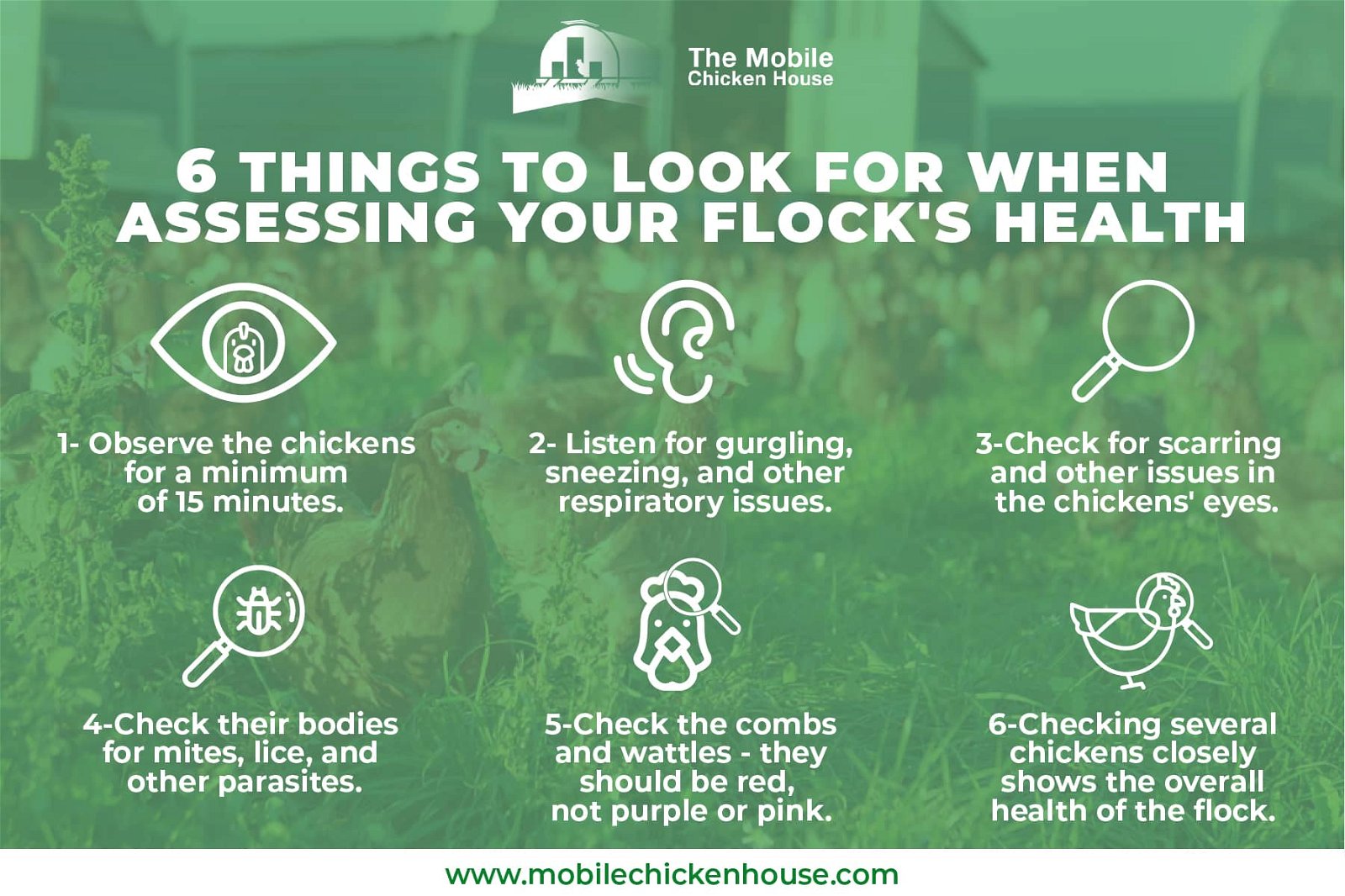
The bottom line is that doing a proper health check on your chickens takes time and energy. You need to do it regularly, and you need to do it carefully. If you catch health issues early you may be able to deal with them simply, before they get too serious.
If you find that some of your flock is unhealthy, pinpoint the cause of the problem, and work hard to implement a solution.
If your flock is healthy, congratulations! Keep being vigilant and take good care of your chickens!
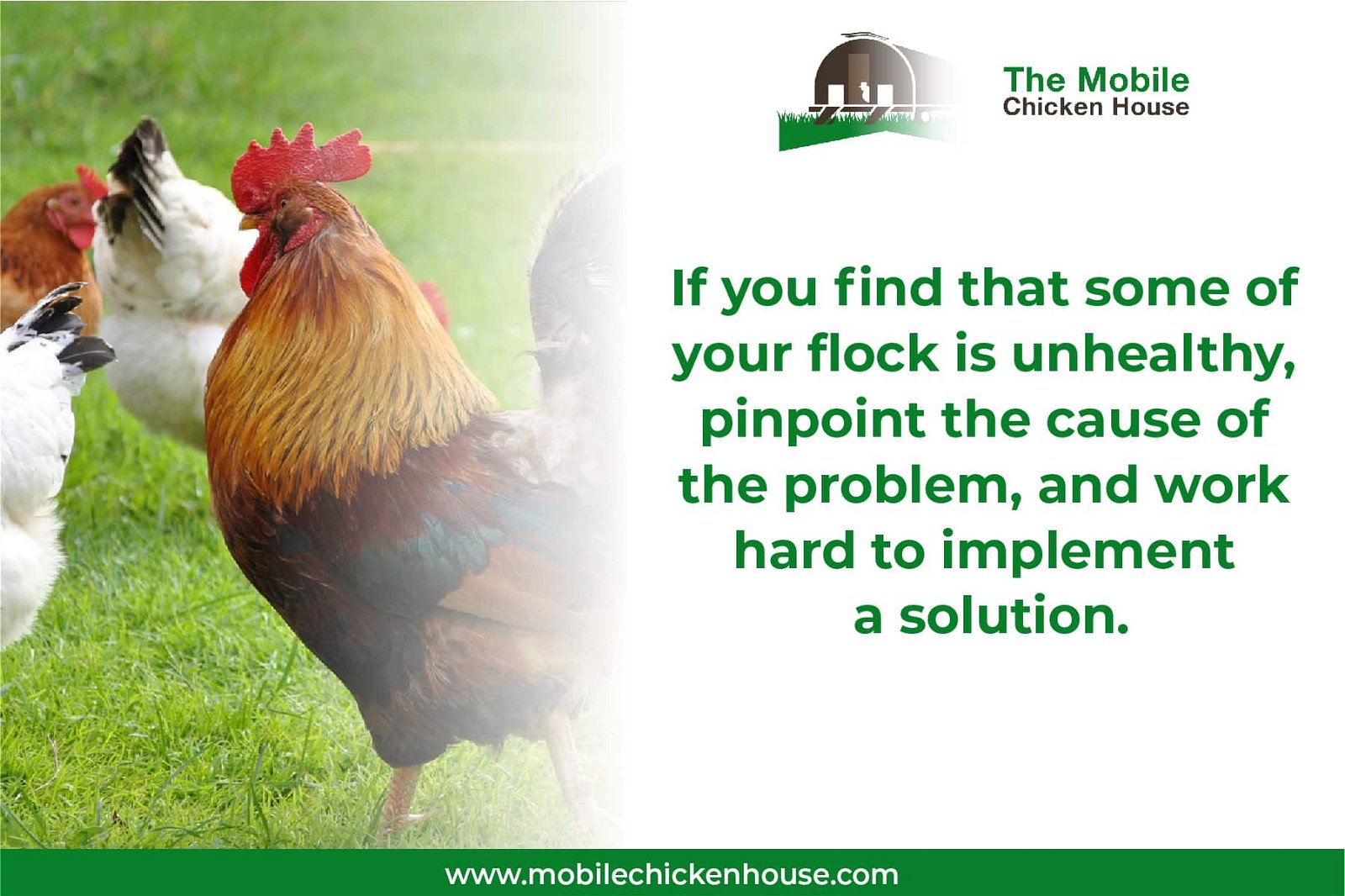
3 Common Mistakes Every Chicken Farmer Must Avoid
Ok, so we know chickens need to be healthy, and we know how to perform a health check on a flock.
Now, how should a chicken farmer go about ensuring the sustained health of his chickens?
Let's start by exploring some of the most common mistakes chicken farmers make.
Mistake #1: Showing up for a few minutes a day to give the chickens feed and water, and then leaving.
We get it - cutting labor is always a plus. That's why we've designed mobile chicken houses specifically designed to save you time.
Still, raising chickens takes time and energy! Regardless of the size of your flock, you can not afford to put the chickens on auto-pilot. They are living, breathing creatures and need care and monitoring.
It's a common idea that taking care of chickens is an excellent job for children. Unfortunately, this is not an accurate picture of reality - at least not if you want a healthy flock!
Having your children help you manage your flock is fantastic, but giving them sole responsibility is not. Chickens take intentional care and management that children can't offer.
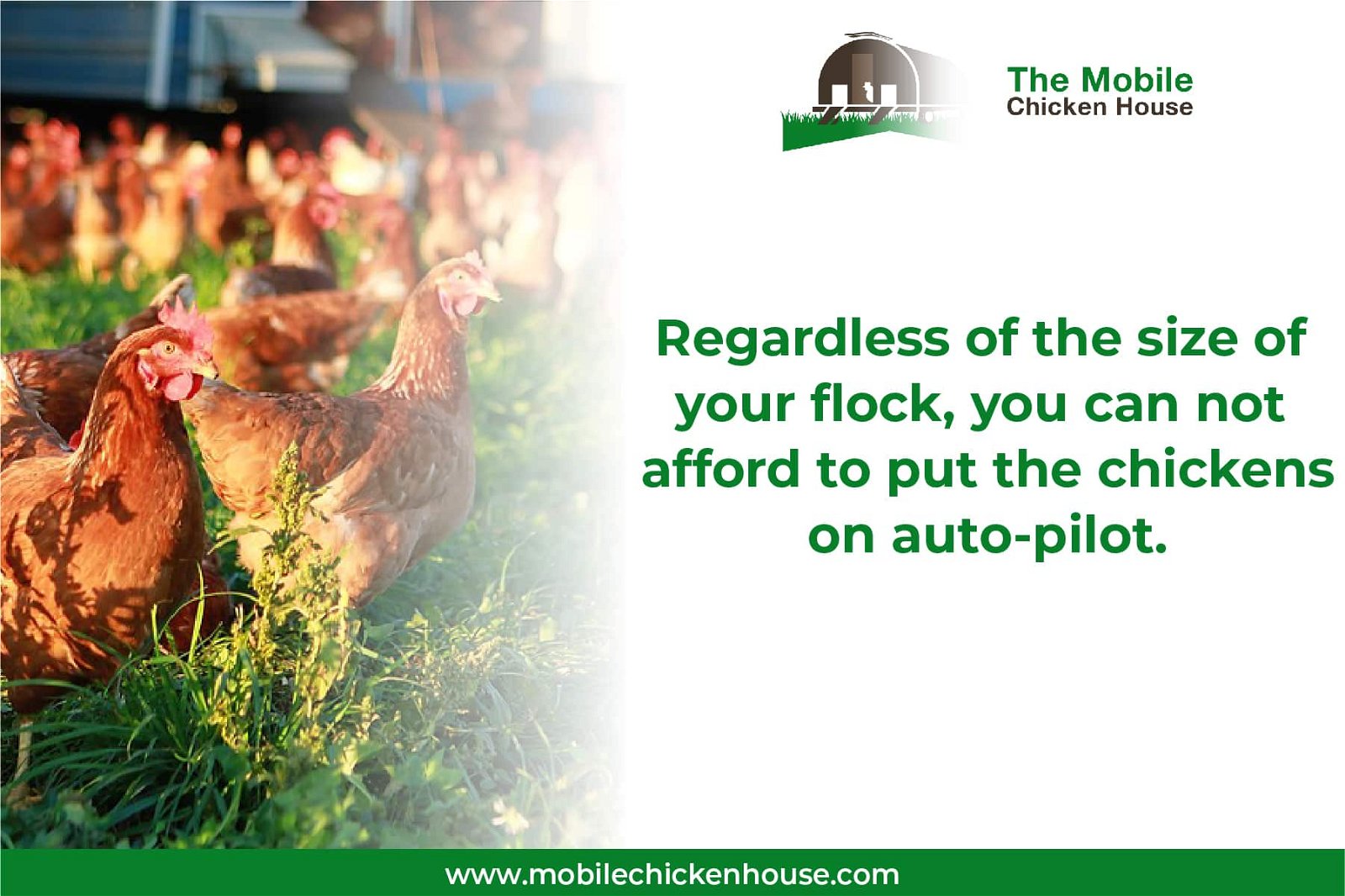
Mistake #2: Thinking chickens are sun worshippers.
While many people think that chickens want to be in the sun all the time, that is not true! Close observation of chickens reveals that they seek out shady areas between 10 AM and 2 PM.
Making sure chickens have access to their food and water in a shaded environment is critical. A common mistake among chicken farmers is leaving their chicken feed and water in direct sunlight.
Forcing the chickens to go out of their comfort zone of shade causes them to decrease in egg production and is harmful to their health. I mean, would you want to bake in the sun all day?
Mistake #3: Not providing adequate protection from predators.
Among the animal world, chickens aren't the most fearsome figures. In fact, they are quite vulnerable to predators. Almost any predator out there would love to eat a chicken, given the chance.
So, when chicken farmers don't offer adequate protection from predators, they make a massive mistake!
If your chicken coop is stationary, fencing or netting is an excellent way to keep predators away. If it is mobile, a guard dog or a fearsome goose does a great job of fending off most predators.
Still, aerial predators like hawks or owls can cause problems. After all, how do you deter a predator from the air?
Well, the sad truth is: if you're in the business of raising chickens, you will lose some hens. Especially if you raise free-range or pasture-raised chickens, some will get nabbed by aerial predators. It's how nature works.
However, if you have an awning, or if you've created a way for your chickens to get shade, you are doing a lot to protect against aerial predation.
Why?
Because hawks often hunt during the middle of the day, and that is when your chickens will be taking shelter under the shade covering! It also gives your chickens a place to run and take cover if they spot an air attack.
So, a shade covering combined with a guard dog or goose is the best way to protect your chickens from aerial predators, especially if you have a mobile, pasture-raised flock.

3 Key Factors In Keeping Chickens Healthy
Keeping chickens healthy isn't just about avoiding particular mistakes. It's about taking proactive action in crucial areas.
So, what is it you absolutely must be doing if you want healthy chickens?
You have to create an amazing environment for your chickens to live in.
It all boils down to that - creating the right environment where your chickens can thrive.
In particular, there are three factors that need careful attention when thinking about the environment a chicken will be living in.
- Air Quality
- Water Quality
- Feed Quality
1 - Air Quality
Who likes stinky, stale air?
Nobody, not even chickens.
In fact, chickens that don't have access to quality air are bound to be unhealthy chickens. Yet, chicken coops are often a place where there is a lot of unhealthy air.
For example, ammonia is found in the air of every single chicken house. Ammonia is naturally produced from chicken droppings, and if the concentration of ammonia in the air is too high, it becomes an extreme irritant to the hens.
When chickens are housed in confined, indoor spaces with accumulated manure, they are often exposed to high concentrations of ammonia, especially when the area is infrequently or inadequately cleaned out on a regular basis.
It's true that humans can smell ammonia. In this case, you can't count on your nose, though. Chicken's tolerance for ammonia is well below what you can detect. By the time humans smell it, it's too late for the chickens.
If you smell ammonia, lung damage has occurred - growth rates will be reduced, and your chickens' mortality rates will increase.
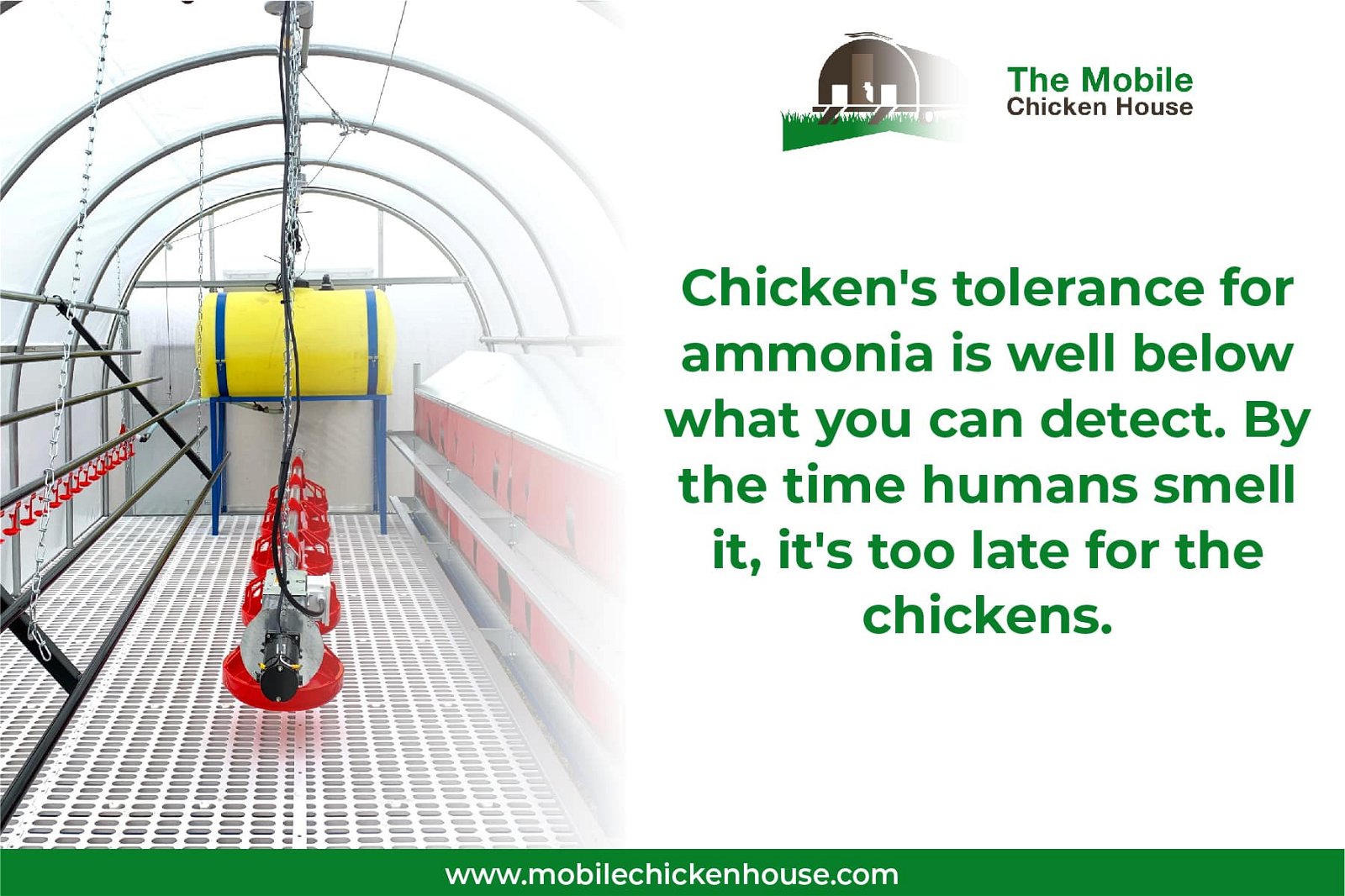
Excess humidity is also a problem in air quality. It will promote infectious respiratory diseases as well as bacterial and fungal growth.
Sometimes chickens simply don't have enough oxygen in the air to breathe well. This comes from having a lot of chickens in small spaces without adequate airflow. The combination of chickens exhaling and manure composting significantly reduces the oxygen content in the room.
And what is oxygen replaced with? Either Carbon Monoxide or Carbon Dioxide.
Yikes. That's not going to keep your chickens healthy!
So what can you do to make sure your hens are getting quality air? Here is a checklist:
- Replace bedding regularly! Doing so keeps bedding from getting wet. Wet bedding is often the cause of excess ammonia and humidity.
- Frequently remove manure.
- If your chickens are in an enclosed coop all day, you must completely replace the air 4-6 times daily. Since you don't want direct drafts on your hens, this is best done with a fan and vent.
- Purchase an ammonia detector or ammonia test strips
- Allow chickens unlimited access to the outdoors with a mobile chicken house.
2 - Water Quality
Leonardo da Vinci is credited with saying, "Water is the driving force of all nature." It's true! We need it. Chickens need it. Everything needs water!
And we need not just water, but good, clean water. For chickens, good water plays a critical role in their health.
For example, water is an essential part of chickens digesting their food. Water in the crop (a pouch-like organ at the end of the esophagus that digests food) softens the feed so that digestion can occur. Without water, dry feed forms clumps in the crop that can press on the chicken's carotid artery.
Water is also an essential part of egg production. An egg consists of approximately 75% water, and without access to a regular, clean water supply, a hen will be physically unable to produce eggs.
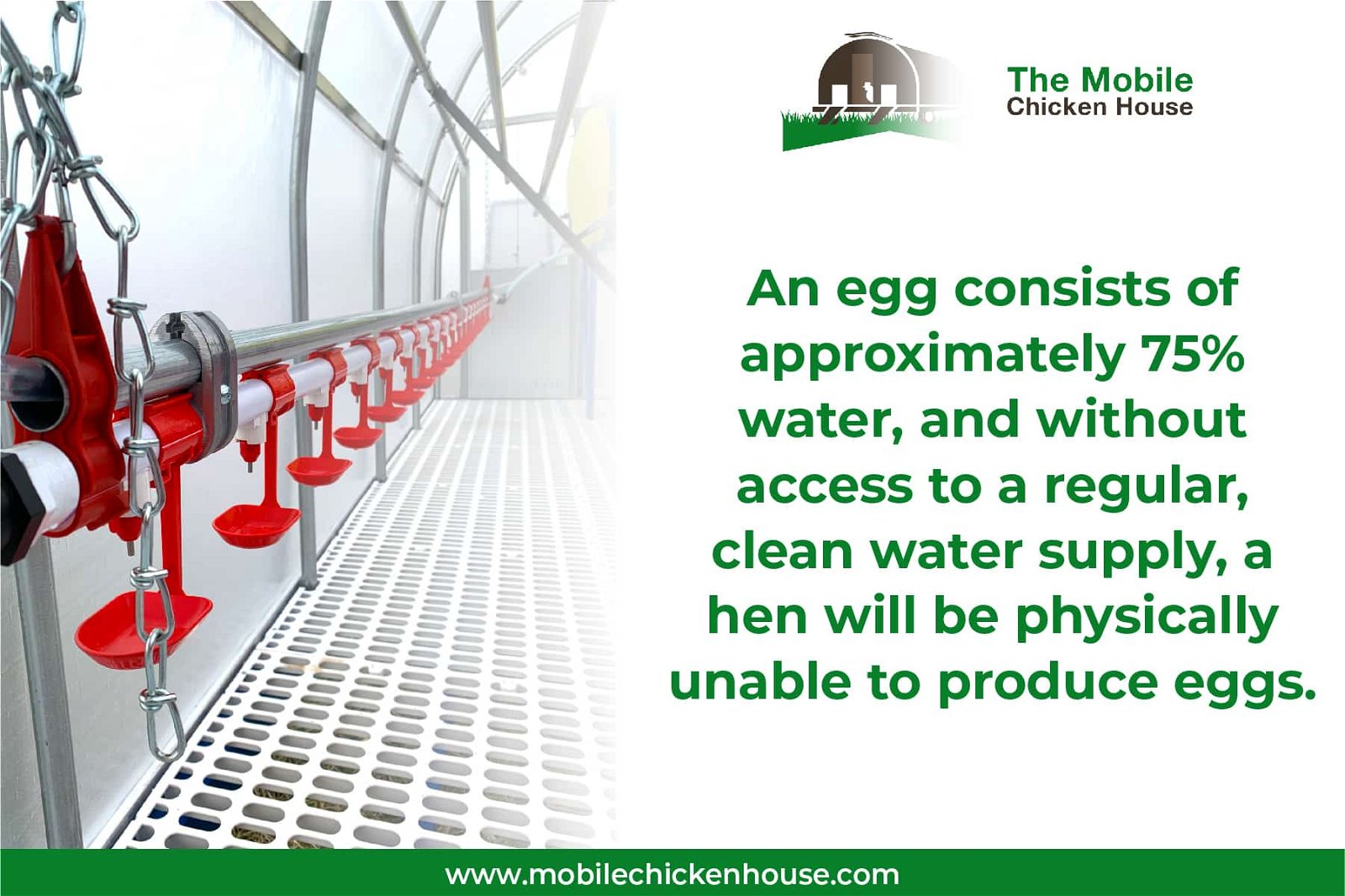
Beyond that, water contaminants such as bacteria, nitrates, and excess minerals adversely affect your chickens' performance as egg layers.
Water pH also affects poultry performance. The ideal water pH for chickens is between 6.7 and 7. To put it in perspective, that falls neatly within the range that humans have for water consumption, which is 6 - 8.5.
Best practice in this area is simply to get your water tested. While testing water costs money, you quickly gain that money back in increased chicken health.
So, what are the most important things to remember when giving water to your chickens?
- The water-to-feed ratio at a reasonable temperature (75-80 degrees) is 2:1. In other words, for every pound of feed a chicken is eating, it should be drinking 2 pounds of water. When the temperature increases, the chickens need even more water.
- Have enough space for at least 50% of the chickens to drink at the same time
- Remember, chickens don't have tongues or lips, so they have to tilt their heads back to drink. To be more efficient, make sure the rim of your waterer is level with the average chicken's back.
- Make sure the water you are serving is healthy, and replace it regularly. If you wouldn't drink it, it's probably not fit for your chicken to drink.
3 - Feed Quality
Have you ever experienced food poisoning? It's pure agony, isn't it?
Luckily, it usually only lasts 24-48 hours, but when you have it, there's no doubt in your mind (or stomach) that you are quite sick.
In its purest form, food poisoning is just eating contaminated food. If you make a pattern of eating contaminated food, you will have more than just food poisoning - your health will continually spiral downward until you stop eating the bad food.
The same is true for chickens.
It doesn't work to grab the cheapest feed off the shelf at your local animal or hardware store, throw it to the chickens, and expect them to thrive.
In fact, grabbing a random bag of feed from the hardware store isn't a good idea at all.
If you look at the nutritional label of a generic feed from a retail store, you'll notice words like "processed grain products," "processed grain by-products" and "processed protein products."
Those are generic terms that allow the feed manufacturer to make changes without telling you, or notifying anybody.
We aren't out to spread rumors or call foul on anyone, but here's the truth: those generic labels allow feed manufacturers to use whatever product is cheapest at the moment to make their feed, whether that be corn, oats, barley, or wheat.
Most often, feed manufacturers are concerned with making feed that is cheap for them to produce, not with creating quality feed.
While feeding your chickens this feed probably won't kill them, it certainly won't make them the healthiest they can be. Their production lessens, and they are more susceptible to disease.
And the scariest part?
Traces of what chickens eat show up in their eggs. That means that if your chickens consume feed that has been sprayed with chemicals, you're consuming that as well when you eat their eggs.
That's not fun to think about, is it?
With that in mind, here is our advice to rule the day when it comes to feeding:
Work with a small feed mill manufacturer that is willing to share exactly what goes into their feed.
Of course, you still need to know what to look for when you ask a manufacturer about their feed, so keep reading for six things to check for in your chicken feed…
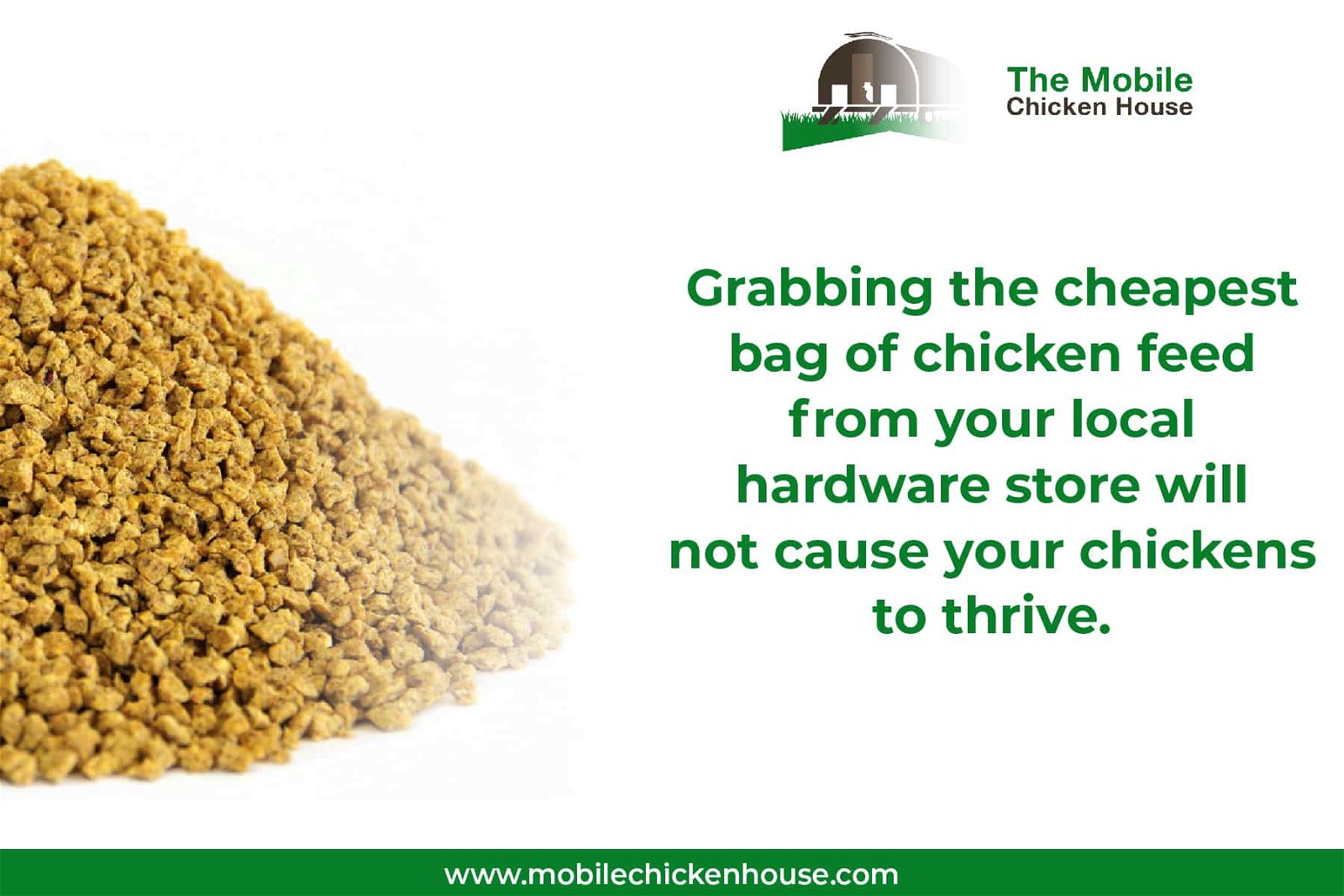
6 Things To Check For In Quality Chicken Feed
What are the components of good feed that you should make sure you are getting?
- Make sure the feed is fresh. Feed is best used within 14 days of processing. Note that this means from when the feed was processed at the mill, not when you buy it. If 14 days feel impossible, that is ok, but try very hard not to exceed feed that is over 30 days old.
- Get a balanced feed for your chickens. Chickens need different kinds of feed, depending on their age and production level. Make sure you are getting feed that meets your chickens' needs. If you have chickens that vary in age, you should buy different feeds to meet their needs.
- Ensure your feed is free of mold and toxins. Ask your feed manufacturer if they have a protocol or system of testing their products as they come in to ensure they are mold and toxin-free.
- Consider the texture of the feed. Again, consider your chickens when you choose the texture of your feed. Young chickens need a finer texture (not powder!), and older chickens prefer a coarser texture of feed. For chicks, anything from an ⅛ inch to a ¼ inch particle size is ideal. Adult chickens can handle particle sizes up to ⅜ of an inch. For easy reference, a particle size that is about the size of a grain of wheat is ideal.
- Check for grit in the feed. Grit is gravel that is included in your chicken's feed. Since chickens don't have teeth, they have to use a muscle called the gizzard to grind their feed. Including grit in your chicken's feed makes this process much easier for them and increases their gut health.
- The essential ingredients. If you've been wondering, here are ingredients a good feed should include: a type of cracked corn, a variation of a small grain like barley or wheat, and alfalfa meal. If you opt to go with soy in your feed, make sure to choose heat-processed soy instead of solvent-extracted soy.
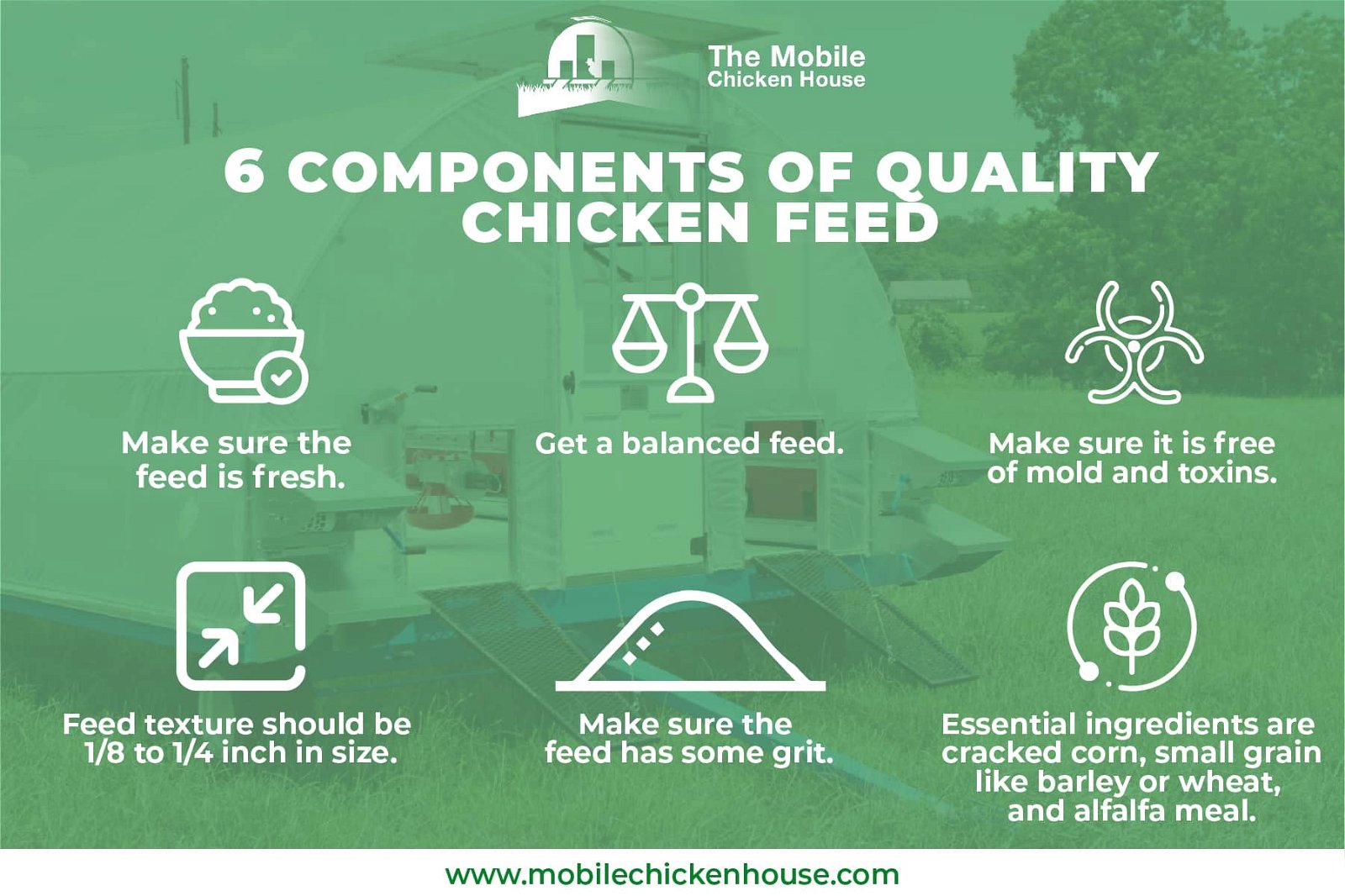
Once you've chosen the right feed, you've cleared the main hurdle with feeding your chickens. However, there are some tips and tricks that are handy to keep in mind when feeding your chickens.
Let's explore those tidbits of advice that will help you keep healthy chickens.
- The rim of your feeder should be even with the average bird's back. This will keep them from picking through the food and keep their diet balanced. It also keeps the chickens from wasting as much food.
- Don't overfeed your chickens. When you return to feed your chickens after their last meal, you should not see more than 10% of their feed remaining in the trough.
- Make sure your chickens have enough space to eat. For chicks include at least an inch of feeder space per chick, and increase this space by a ¼ inch weekly as they grow. At eight weeks old, chickens should have 3-4 inches per bird.
Conclusion
Congratulations, you made it to the end!
By now, you should understand the importance of healthy chickens, know how to assess your flock's health, be aware of mistakes to avoid, and be equipped with the knowledge you need to keep your chickens healthy!
At The Mobile Chicken House, we care about chicken health and high-quality eggs. That's why we've included features in our mobile chicken houses specifically with the health of chickens in mind.
We make raising chickens in a mobile pasture easy, which gives your chickens access to lots of fresh air and organic food. Our automated feeding systems also allow you to regulate how much food and water each chicken gets.
If you are interested in getting a quote for a mobile chicken house or have more questions about mobile-pastured eggs, please contact us today!
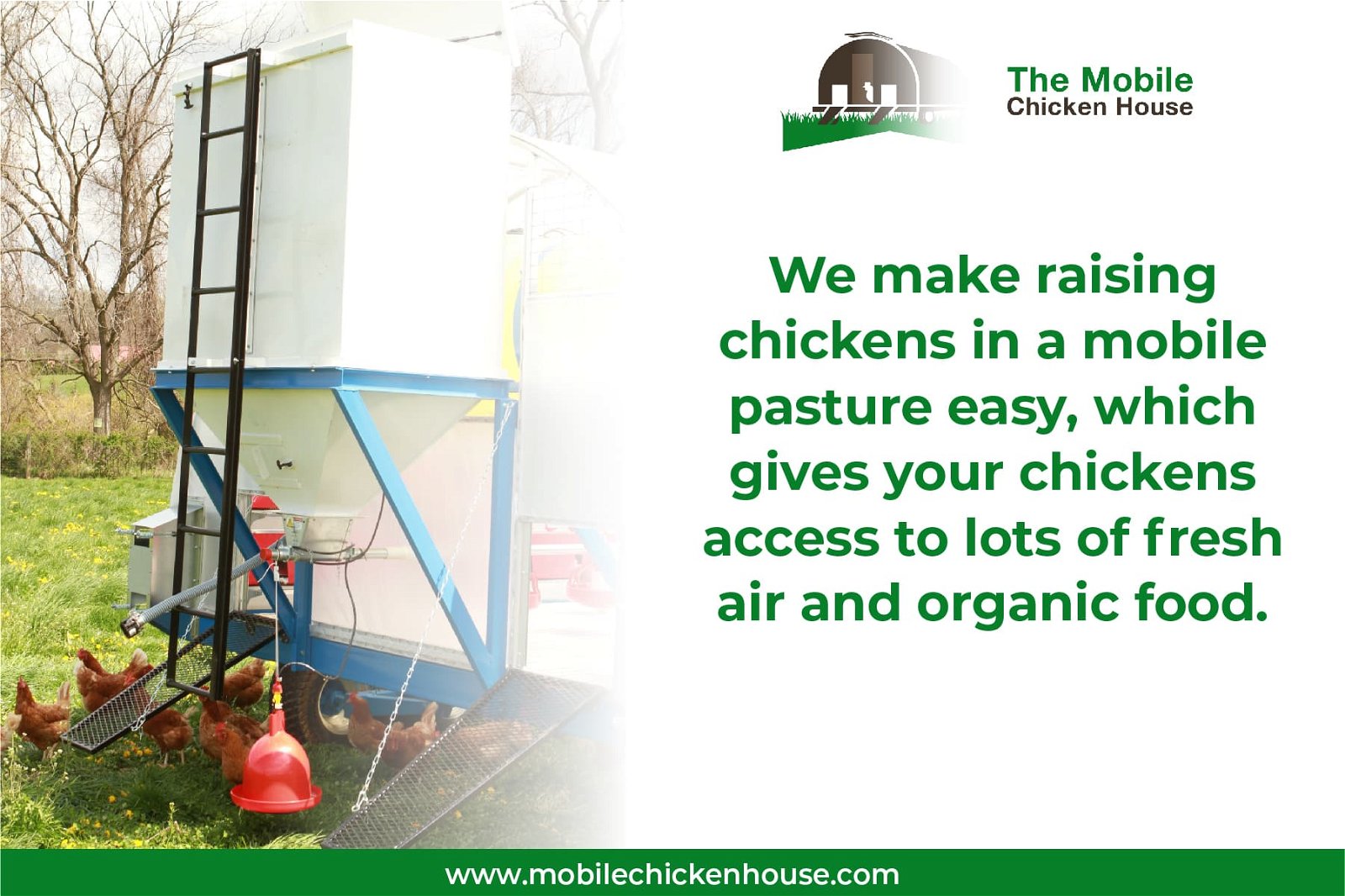

That was very helpful!
Awesome! ?